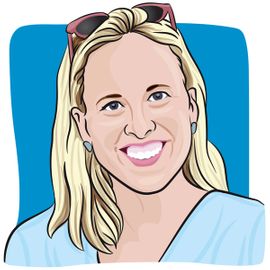- About Us
- Advertise / Support
- Editorial Board
- Contact Us
- CancerNetwork.com
- TargetedOnc.com
- OncLive.com
- OncNursingNews.com
- Terms & Conditions
- Privacy
- Do Not Sell My Information
- Washington My Health My Data
© 2025 MJH Life Sciences™ and CURE - Oncology & Cancer News for Patients & Caregivers. All rights reserved.
Not a Love Story, But a Story About Love

Erica Finamore is an editor and writer from New York City. After 26 months of caregiving, she lost her husband to glioblastoma, a terminal brain cancer, at age 30. She is a brain tumor research advocate and member of the Gray Nation Endurance Team through National Brain Tumor Society.
Instead of using the cliché of calling the story of her and her husband’s relationship a classic “love story”, this caregiver who lost her husband to glioblastoma after just 26 months reflects on why she prefers to focus on the fact that they weren’t superhuman – they were just lucky enough to find each other.
Jon and I were not a love story, and you might think that having to announce that makes it more of a love story. But for me, it does not. In my super-biased opinion, a classic love story is girl meets boy, boy goes off to war, boy and girl write letters to each other which somehow get delivered to the right bunker, boy comes home from war without PTSD and with all his original appendages, boy marries girl, they live into their 90’s and are eulogized by one of their five adorable great grandchildren.
In my story, my 28-year old husband and college sweetheart, Jon Marc, was diagnosed with terminal brain cancer just four months after our wedding. Jon was a neurologist at the time, and yes, we also found it ironic that a brain doctor got brain cancer. At 28, everything I assumed my life would become disappeared instantly and 26 months later, so did Jon.
When people read about Jon and I, “the ultimate love story” is the phrase they’ll often turn to. In fact, we’ve had a couple of articles published about us that were titled “Love Story.” I can understand why — and it’s a lovely, positive thing to think about us. I’m glad people saw our relationship and thought we were that kind of couple and didn’t instead coin us “the ultimate shitshow.”
People would call us a love story and use these profound terms that made us seem like we were bigger than we were, super-human almost. As a society, we often do this with cancer or illness; we use that language to separate ourselves from these harrowing tales. People are “heroes” who fight “battles” and we talk about our “journey” through the world of terminal illness. But real illness doesn’t feel that way.
Yes, it’s dramatic and emotional and surreal but it’s also much smaller … even monotonous sometimes. Between those moments of shock are millions of little average ones; frustration when your doctor is running late and you’re both hangry or elation when you end a tough week and discover that a new season of “British Baking Show” has been added to Netflix. And those moments are the ones I play in my head now, not the big ones. I dream about those average days where we just felt like us; like anyone else.
Phrases like “love story,” and “lost his battle” don’t compliment the ill as much as they distance the writer and reader from thinking and feeling like something like that could ever happen to them. People in a “love story” are the others — their misfortune or fortune is just crazy, so we write it off as random and foreign. Realistically, people die of cancer and thousands of other things, seemingly randomly, every day — leaving their spouses, partners, girlfriends, boyfriends and non-labeled people before their time is due.
And no matter how old you are, you will always feel robbed of time with a loved one — that’s just the way it is. When people see our story as something exceptional, they discount that as a society we have a real problem that needs to be solved and is affecting very normal people. Brain cancer is real and it’s random and it actually could happen to anyone — I want people to empathize and then take action, not tear up at a Romeo and Juliet-type horror and then move forward with their day.
As humans, we are always in denial about a multitude of things. That’s the way it should be and has to be, because how else would we get through the day? We’d be so paralyzed by fear that we wouldn’t really live at all. But somewhere between believing in love stories and believing everything is scary, there’s a place for people to do good: To recognize a heartbreak, learn more about an issue and feel deeply for the very real people who were put through such an unlucky bit of fate.
When people read about us, I want them to think wow those people were able to survive through a horrible time in the best way they could. We weren’t the ultimate love story — we were two people who were in love and loved each other deeply, but we weren’t superhuman, we were just lucky enough to find each other. That’s it, no magical myth.
For more news on cancer updates, research and education, don’t forget to subscribe to CURE®’s newsletters here.
Related Content:


